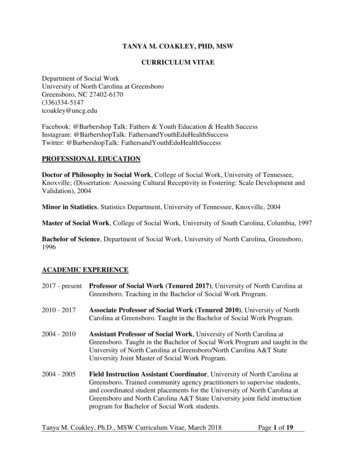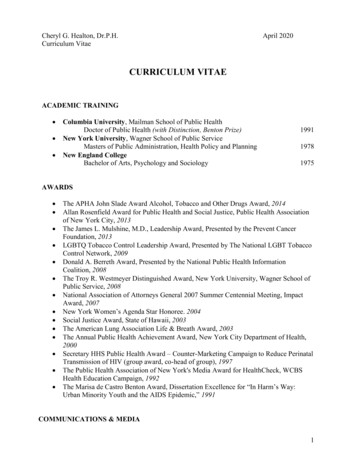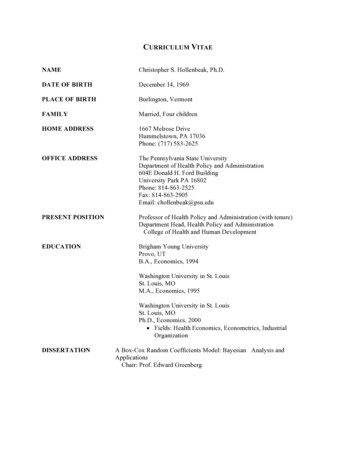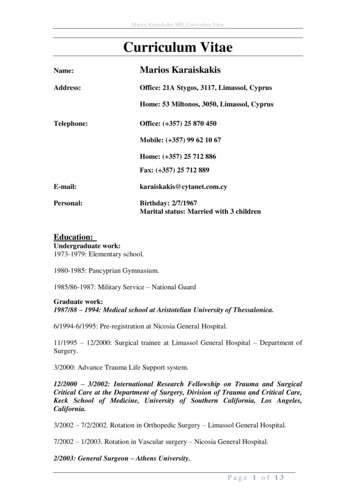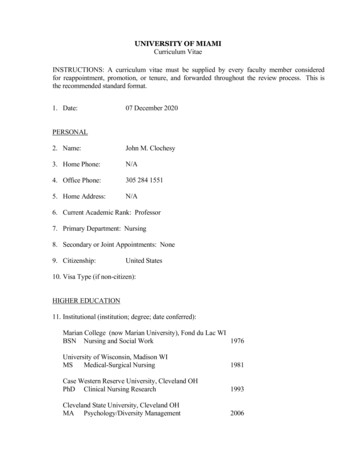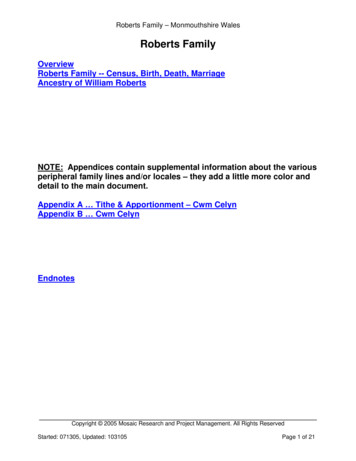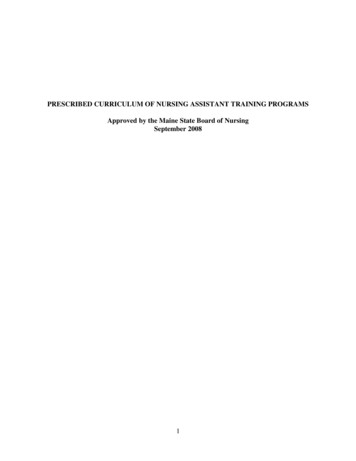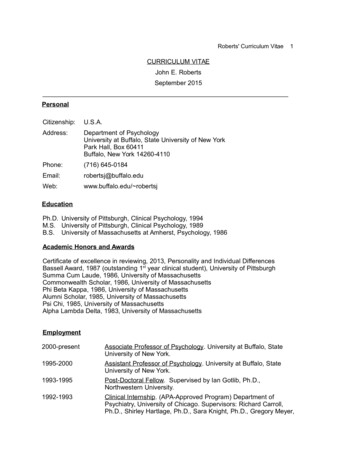
Transcription
Roberts' Curriculum Vitae1CURRICULUM VITAEJohn E. RobertsSeptember 2015PersonalCitizenship:U.S.A.Address:Department of PsychologyUniversity at Buffalo, State University of New YorkPark Hall, Box 60411Buffalo, New York 14260-4110Phone:(716) edu/ robertsjEducationPh.D. University of Pittsburgh, Clinical Psychology, 1994M.S. University of Pittsburgh, Clinical Psychology, 1989B.S. University of Massachusetts at Amherst, Psychology, 1986Academic Honors and AwardsCertificate of excellence in reviewing, 2013, Personality and Individual DifferencesBassell Award, 1987 (outstanding 1st year clinical student), University of PittsburghSumma Cum Laude, 1986, University of MassachusettsCommonwealth Scholar, 1986, University of MassachusettsPhi Beta Kappa, 1986, University of MassachusettsAlumni Scholar, 1985, University of MassachusettsPsi Chi, 1985, University of MassachusettsAlpha Lambda Delta, 1983, University of MassachusettsEmployment2000-presentAssociate Professor of Psychology. University at Buffalo, StateUniversity of New York.1995-2000Assistant Professor of Psychology. University at Buffalo, StateUniversity of New York.1993-1995Post-Doctoral Fellow. Supervised by Ian Gotlib, Ph.D.,Northwestern University.1992-1993Clinical Internship. (APA-Approved Program) Department ofPsychiatry, University of Chicago. Supervisors: Richard Carroll,Ph.D., Shirley Hartlage, Ph.D., Sara Knight, Ph.D., Gregory Meyer,
Roberts' Curriculum VitaePh.D., Mark Reinecke, Ph.D.Grant Funding: PastNIMH 1R01 MH080086-01 A2 (Co-Investigator, Len Simms PI)“Development of a Computerized Adaptive Test of Personality Disorder (CAT-PD)” 1,740,134 direct costs (Total costs 2,575,361)August 2008 – May 2013UB 2020 Scholar's Fund (Principal Investigator)"A Typological Approach to Problematic Treatment Adherence among HIV Patients" 11,500March 2007 - December 2008NIH National Research Service Award (Sponsor/Principal Investigator)"Impact of Life Stress on HIV Treatment Adherence" 63,769 direct costsSeptember 2005-December 2007NIH National Research Service Award (Sponsor/Principal Investigator)"Social Anxiety and the Direction of Attentional Focus" 40,500 direct costsSeptember 2001-May 2004NARSAD Young Investigator Award (Principal Investigator)"Ruminative Response Style in Major Depressive Disorder" 60,000 direct costsJuly 2000-June 2002NIMH B/START Award (Principal Investigator)"Self-Esteem and Rumination in Depression-Prone Persons" 25,000 direct costsJuly 1999-June 2000 (no cost extension to June 2001)Ad Hoc Grant ReviewerIsrael Science Foundation (ISF), 2005AmfAR – The Foundation for AIDS Research, 2007The Netherlands Organization for Health Research and Development (ZonMw), 2007The Swiss National Science Foundation (SNSF) Professorship Program, 2008Associate EditorCognition and Emotion (2008 to present)Cognitive Therapy and Research (2009 to 2011)Editorial BoardsAIDS Patient Care and STDs (2005 to present)Cognitive Therapy and Research (2006 to 2008; 2012 to present)2
Roberts' Curriculum Vitae3Emotion (2005 to 2007)Personality and Individual Differences (2007 to present)Ad Hoc Editorial ConsultantBehaviour Research and TherapyBritish Journal of Clinical PsychologyBritish Journal of Medical PsychologyCanadian Journal of Behavioral ScienceHealth PsychologyHIV MedicineJournal of Abnormal PsychologyJournal of Abnormal Child PsychologyJournal of Anxiety DisordersJournal of Applied Social PsychologyJournal of Cognitive PsychotherapyJournal of Consulting and Clinical PsychologyJournal of Personality and Social PsychologyJournal of Psychosomatic ResearchJournal of Social and Clinical PsychologyJournal of Social and Personal RelationshipsMemoryPersonality and Social Psychology BulletinPsychological AssessmentPsychology and PsychotherapyPsychophysiologyPsychosomaticsSelf and IdentitySocial Behavior and PersonalityBook Manuscript and Proposal ReviewsAmerican Psychological AssociationElsevierDepartmental and University ServiceDirector of Clinical Training – Clinical Area Head 2003-2007; 2013Director of Graduate Studies and Admissions 2000-2001Chair, Clinical Search Committee 2002-2003Chair, Department Search Committee 2001-2002Behavioural Neuroscience Search Committee 2004-2005Extreme Events Search Committee 2007Clinical Area Search Committee 1995-1996, 1996-1997, 1998-1999, 2005-2006Social Area Search Committee 2012Policy and Planning Committee 2004-2005Personnel Committee 2003-2007Psychological Services Center Board 1995-2007, 2011-presentDepartment Website Committee 2001-2002Clinical Area Graduate Admissions Committee, Chair 1996-1999, 2003-2006, 2010-2011Grievance Committee 1996-1999Graduate Studies Committee 1999-2001Divisional Grievance Committee 1999Faculty Senate Committee on Information and Library Resources 2000-2007Reviewer for UB2020 Scholar application 2008IRB Committee 2012-presentCourses TaughtUndergraduatePersonality PsychologyMood Disorders
Roberts' Curriculum Vitae4GraduateDevelopments in Depression ResearchDepression Practicum: 'The Coping with Depression Course'PsychopathologyClinical Assessment IIPracticum I and II (clinical supervision of second year students)Clinical Treatments I (Adult)Ph.D. Committees ChairedChrystal VergaraPaula YanesJames PrisciandaroKathyrn BottonariChristine CalmesMorgen KellyLorig Kachadourian (on-site chair)Jeffrey CieslaJulie Hall (on-site Chair)Stephanie GambleTodd KashdanAnne ShapiroDavid DirenfeldExternal Examiner for Doctoral DefensePhillip Dodgson (University of Waterloo)Katayoun Parsi (Concordia University)Visiting Scholars HostedGonzalo Hervas, Ph.D., 2002, visiting doctoral student from University of Madrid, SpainShouxin Li, Ph.D., 2008, visiting faculty from Shandong Normal University, People's Republic ofChinaClinical Experience1996-PresentDirector, Depression Research and Treatment Program, SUNY Buffalo.Provided clinical supervision for over 150 cases receiving grouppsychoeducational treatment or individual behavioral activation therapy,as well as over 300 diagnostic evaluations, to date. Maintains ongoingcaseload of 1-3 clients.1996-PresentClinical Supervisor, Psychological Services Center, SUNY Buffalo.Group and individual supervision primarily to 2nd year doctoral students.1992-1993Clinical Psychology Intern, University of Chicago (APA Approved).Specialty rotations: Psycho-oncology, Assessment, Women’s Clinic,
Roberts' Curriculum Vitae5Cognitive Therapy with Children and Adolescents.1991-19921990-1991Clinic Coordinator, University of Pittsburgh.Clinic Assistant, University of Pittsburgh.19911986-1991Psychology Extern, St. Francis Hospital, Pittsburgh, PA.Psychology Practicum, University of Pittsburgh.1984, 19861985Counselor for Mentally Retarded Adults, CCSV, Hyannis, MA.Psychiatric Counselor, Bay Cove Human Services, Boston, MA.Clinical Workshops and PresentationsRoberts, J.E., Direnfeld, D.M., & Ciesla, J.A. (March, 1999). Group treatment fordepression. Workshop presented at the Behavioral Health System Lecture Series:Innovations in group treatment, Buffalo, NY.Roberts, J.E. (6/05; 6/06; 6/07; 6/08). Behavioral activation for depression. Presentation topsychiatry residents at University at Buffalo School of Medicine.Peer Reviewed Articles (articles with a student as first author are denoted by an asterisk)1.*Vergara-Lopez, C. Lopez-Vergara, H., & Roberts, J.E. (2015).Testing a “content meetsprocess” model of depression vulnerability and rumination: Exploring the moderating roleof set-shifting deficits. Journal of Behavior Therapy and Experimental , Y., Yanes, P.K., & Roberts, J.E. (2015). Disentangling the specificity ofautobiographical memory: Distinctiveness versus detail. Memory.3.Hoorens, V., Takano, K., Franck, E., Roberts, J. E., & Raes, F. (2015). Initial and noninitialname-letter preferences as obtained through repeated letter rating tasks continue toreflect (different aspects of) self-esteem. Psychological Assessment, 27, 905-914.doi:10.1037/pas00000924.*Vergara-Lopez, C. & Roberts, J.E. (2015). An application of Behavioral ActivationTherapy for Major Depressive Disorder in the context of complicated grief, low socialeconomic status, and ethnic minority status. Clinical Case Studies, 14, 247-261.5.*Vergara-Lopez, C., Kyung, Y., Detschmer, A., & Roberts, J.E. (2014). Testing theCognitive Catalyst Model with idiographic content: Rumination moderates the associationbetween self-discrepancies and depressive symptoms. Journal of ExperimentalPsychopathology, 5, 351-362.6.*Gamble, S.A., Chronis-Tuscano, A. Roberts, J.E., Ciesla, J.A., & Pelham, W.E. (2013).Self-esteem reactivity among mothers of children with Attention-Deficit/HyperactivityDisorder (ADHD): The moderating role of depression history. Cognitive Therapy andResearch, 37, 1233–1242.
Roberts' Curriculum Vitae67.*Yanes, P.K., Morse, G.D., Hsiao, C.B., Simms, L.J., Roberts, J.E. (2012).Autobiographical memory specificity and the persistence of depressive symptoms in HIVpositive patients: Rumination and social problem solving skills as mediators. Cognition &Emotion, 26 (8), 1496-1507.8.*Vergara, C. & Roberts, J.E. (2012). Self-discrepancies in vulnerability to depression: Therole of feared self-guides. Cognitive Therapy and Research, 36, 847–853.9.*Calmes, C.A. & Roberts, J.E. (2012). Erratum to: Repetitive thought and emotionaldistress: Rumination and worry as prospective predictors of depressive and anxioussymptomatology. Cognitive Therapy and Research, 36, 258.10. *Vergara, C. & Roberts, J.E. (2011). Motivation and goal orientation in vulnerability todepression. Cognition & Emotion, 25, 1281-1290.11. *Ciesla, J.A., Felton, J.W., & Roberts, J.E. (2011). Testing the Cognitive Catalyst Model ofdepression: Does rumination amplify the impact of cognitive diatheses in response tostress? Cognition & Emotion, 25, 1349-1357.12. Simms, L.J., Goldberg, L.R., Roberts, J.E., Watson, D., Welte, J., & Rotterman, J.H.(2011). Computerized adaptive assessment of personality disorder: Introducing the CATPD Project. Journal of Personality Assessment, 93, 380-389.13. *Kashdan, T.B. & Roberts, J.E. (2011). Comorbid social anxiety disorder in clients withdepressive disorders: Predicting changes in depressive symptoms, therapeuticrelationships, and focus of attention in group treatment. Behaviour Research and Therapy,49, 875-884.14. *Prisciandaro, J.J. & Roberts, J.E. (2011). Evidence for the continuous latent structure ofmania in the Epidemiologic Catchment Area from multiple latent structure and constructvalidation methodologies. Psychological Medicine, 41, 575-588.15. *Yanes, P.K., Tiffany, S.T., & Roberts, J.E. (2010). Cognitive therapy for co-occurringdepression and behaviors associated with Passive-Aggressive Personality Disorder.Clinical Case Studies, 9, 369-382.16. *Bottonari, K.A., Safren, S.A., McQuaid, J.R., Hsiao, C.B., & Roberts, J.E. (2010). Alongitudinal investigation of the impact of life stress on HIV treatment adherence. Journalof Behavioral Medicine, 33, 486-495.17. *Prisciandaro, J.J. & Roberts, J.E. (2009). Initial treatment success followed by failure:How do we deal with toxic core beliefs in the context of comorbid major depression withpsychotic features, social phobia, and axis ii pathology? Clinical Case Studies, 8, 193-209.18. *Prisciandaro, J.J. & Roberts, J.E. (2009). A comparison of the predictive abilities ofdimensional and categorical models of unipolar depression in the National ComorbiditySurvey. Psychological Medicine, 39, 1087-1096.19. *Calmes, C.A. & Roberts, J.E. (2008). Rumination in interpersonal relationships: Does corumination explain gender differences in emotional distress and relationship satisfaction
Roberts' Curriculum Vitae7among college students? Cognitive Therapy and Research, 32, 577-590.20. *Yanes, P.K., Roberts, J.E., & Carlos, E.L. (2008). Does overgeneral autobiographicalmemory result from poor memory for task instructions? Memory, 16, 669-677.21. *Bottonari, K.A., Roberts, J.E., Thomas, S. N., & Read, J. P. (2008). Stop thinking andstart doing: Switching from cognitive therapy to behavioral activation in a case of chronictreatment resistant depression. Cognitive and Behavioral Practice, 15, 376-386.22. *Ciesla, J.A. & Roberts, J.E. (2007). Rumination, negative cognition, and their interactiveeffects on depressed mood: Two laboratory studies. Emotion, 7, 555-565.23. *Calmes, C.A. & Roberts, J.E. (2007). Repetitive thought and emotional distress:Rumination and worry as prospective predictors of depressive and anxioussymptomatology. Cognitive Therapy and Research, 31, 343-356.24. Kassel, J.D., Wardle, M., & Roberts, J.E. (2007). Adult attachment security and collegestudent substance use. Addictive Behaviors, 32, 1164-1176.25. *Kelly, M.A.R., Roberts, J.E., & Bottonari, K.A. (2007). Non-treatment related suddengains in depression: The role of self-evaluation. Behaviour Research and Therapy, 45,737-747.26. *Bottonari, K. A., Roberts, J. E., Kelly, M. A. R., Kashdan, T. B., & Ciesla, J. A. (2007). Aprospective investigation of the impact of attachment style on stress generation amongclinically depressed individuals. Behaviour Research and Therapy, 45, 179-188.27. *Kashdan, T.B., & Roberts, J.E. (2007). Social anxiety, depressive symptoms, and postevent rumination: Affective consequences and social contextual influences. Journal ofAnxiety Disorders, 21, 284-301.28. *Direnfeld, D.M., & Roberts, J.E. (2006). Mood congruent memory in dysphoria: Theroles of state affect and cognitive style. Behaviour Research and Therapy, 44, 1275-1285.29. Roberts, J.E., Carlos, E.L., & Kashdan, T.B. (2006). The impact of depressive symptoms,self-esteem and neuroticism on trajectories of overgeneral autobiographical memory overrepeated trials. Cognition & Emotion, 3/4, 383-401.30. Monroe, S.M., Guillaumont, J., Torres, L., Harkness, K.L., Roberts, J.E., Frank, E., &Kupfer, D. (2006). Life stress and treatment course of recurrent depression: III. Nonsevere life events predict recurrence over 3 years. Journal of Consulting and ClinicalPsychology, 74, 112-120.31. *Kashdan, T.B., & Roberts, J.E. (2006). Affective outcomes in superficial and intimateinteractions: Roles of social anxiety and curiosity. Journal of Research in Personality, 40,140-167.32. *Chronis, A.M., Gamble, S.A., Roberts, J.E., & Pelham, W.E. (2006). Cognitivebehavioral depression treatment for mothers of children with Attention-Deficit/HyperactivityDisorder. Behavior Therapy, 37, 143-158.
Roberts' Curriculum Vitae833. *Prisciandaro, J.J., & Roberts, J.E. (2005). A taxometric investigation of unipolardepression in the National Comorbidity Survey. Journal of Abnormal Psychology, 114, 718728.34. *Bottonari, K.A., Roberts, J.E., Ciesla, J.A., & Hewitt, R.G. (2005). Life stress andadherence to antiretroviral therapy among HIV individuals: A preliminary investigation.AIDS Patient Care and STDs, 11, 718-727.35. *Kelly, M.A.R., Roberts, J.E., & Ciesla, J.A. (2005). Sudden gains in cognitive behavioraltreatment for depression: When do they occur and do they matter? Behaviour Researchand Therapy, 43, 703-714.36. *Gamble, S.A., & Roberts, J.E. (2005). Adolescents' perceptions of primary caregiversand cognitive style: The roles of attachment security and gender. Cognitive Therapy andResearch, 29, 123-141.37. *Muller, J., & Roberts, J.E. (2005). Memory and attention in Obsessive-CompulsiveDisorder. Journal of Anxiety Disorders, 19, 1-28.38. *Ciesla, J.A., Roberts, J.E., & Hewitt, R.G. (2004). Adult attachment and high-risk sexualbehavior among HIV-positive patients. Journal of Applied Social Psychology, 34, 108-124.39. *Kashdan, T.B., & Roberts, J.E. (2004). Trait and state curiosity in the genesis ofintimacy: Differentiation from related constructs. Journal of Social and ClinicalPsychology, 23, 792-816.40. *Kashdan, T.B., & Roberts, J.E. (2004). Social anxiety’s impact on affect, curiosity, andsocial self-efficacy during a high self-focus social threat situation. Cognitive Therapy andResearch, 28, 118-141.41. *Chronis, A.M., Pelham, W.E., Gnagy, E.M., Roberts, J.E., & Aronoff, H.R. (2003). Theimpact of a late-afternoon dose of stimulant medication on the mood and perceivedcompetence of parents of children with ADHD. Journal of Clinical Child & AdolescentPsychology, 32, 118-126.42. *Ciesla, J.A., & Roberts, J.E. (2002). Self-directed thought and response to treatment fordepression: A preliminary investigation. Journal of Cognitive Psychotherapy: AnInternational Quarterly, 16, 435-453.43. *Southall, D., & Roberts, J.E. (2002). Attributional style and self-esteem in vulnerability toadolescent depressive symptoms following life stress: A 14-week prospective study.Cognitive Therapy and Research, 26, 563-579.44. *Ciesla, J.A., & Roberts, J.E. (2001). A meta-analysis of risk for Major DepressiveDisorder among HIV-positive individuals. American Journal of Psychiatry, 158, 725-730.45. Roberts, J.E. & Gamble, S.A. (2001). Current mood-state and past depression aspredictors of self-esteem and dysfunctional attitudes among adolescents. Personality andIndividual Differences, 30, 1023-1037.
Roberts' Curriculum Vitae946. Roberts, J.E., Ciesla, J.A., Direnfeld, D.M., & Hewitt, R.G. (2001). Emotional distressamong HIV-positive individuals: the roles of acute negative life events and psychologicaldiatheses. Personality and Individual Differences, 30, 241-257.47. McQuaid, J.R., Monroe, S.M., Roberts, J.E., Kupfer, D.J., & Frank, E. (2000). Acomparison of two life stress assessment approaches: Prospective prediction of treatmentoutcome in recurrent depression. Journal of Abnormal Psychology, 109, 787-791.48. Roberts, J.E., Shapiro, A.M., & Gamble, S. (1999). Level and perceived stability of selfesteem prospectively predict depressive symptoms during psychoeducational grouptreatment. British Journal of Clinical Psychology, 38, 425-429.49. *Shapiro, A.M., Roberts, J.E., & Beck, J.G. (1999). Differentiating symptoms of anxietyand depression in older adults: Distinct cognitive and affective profiles? Cognitive Therapyand Research, 23, 53-74.50. Nolan, S.A., Roberts, J.E., & Gotlib, I.H. (1998). Neuroticism and ruminative responsestyle as predictors of change in depressive symptoms. Cognitive Therapy and Research,22, 445-455.51. Roberts, J.E., Gilboa, E., & Gotlib, I.H. (1998). Ruminative response style andvulnerability to episodes of dysphoria: Gender, neuroticism, and episode duration.Cognitive Therapy and Research, 22, 401-423.52. Gilboa, E., Roberts, J.E., & Gotlib, I.H. (1997). The effects of induced and naturallyoccurring dysphoric mood on biases in self-evaluation and memory. Cognition & Emotion,11, 65-82.53. *Hankin, B.L., Roberts, J., & Gotlib, I.H. (1997). Elevated self-standards and emotionaldistress during adolescence: Emotional specificity and gender differences. CognitiveTherapy and Research, 21, 663-697.54. Roberts, J.E., & Kassel, J.D. (1997). Labile self-esteem, stressful life events, anddepressive symptoms: Prospective data testing a model of vulnerability. CognitiveTherapy and Research, 21, 569-589.55. Roberts, J.E., & Gotlib, I.H. (1997). Temporal variability in global self-esteem and specificself-evaluation as prospective predictors of emotional distress: Specificity in predictors andoutcome. Journal of Abnormal Psychology, 106, 521-529.56. Roberts, J.E., & Gotlib, I.H. (1997). Lifetime episodes of dysphoria: Gender, earlychildhood loss, and personality. British Journal of Clinical Psychology, 36, 195-208.57. Roberts, J.E., & Kassel, J.D. (1996). Mood-state dependence in cognitive vulnerability todepression: The roles of positive and negative affect. Cognitive Therapy and Research,20, 1-12.58. Monroe, S.M., Roberts, J.E., Kupfer, D.J., & Frank, E. (1996). Life stress and treatmentcourse of recurrent depression. 2: Post-recovery associations with attrition, symptomcourse, and recurrence over 3 years. Journal of Abnormal Psychology, 105, 313-328.
Roberts' Curriculum Vitae1059. Roberts, J.E., Gotlib, I.H., & Kassel, J.D. (1996). Adult attachment security and symptomsof depression: The mediating roles of dysfunctional attitudes and low self-esteem.Journal of Personality and Social Psychology, 70, 310-320.60. Roberts, J.E., Kassel, J.D., & Gotlib, I.H. (1995). Level and stability of self-esteem aspredictors of depressive symptoms. Personality and Individual Differences, 19, 217-224.61. Johnson, S.L., & Roberts, J.E. (1995). Life events and bipolar disorder: Implications frombiological theories. Psychological Bulletin, 117, 434-449.62. Roberts, J.E., & Monroe, S.M. (1994). A multidimensional model of self-esteem indepression. Clinical Psychology Review, 14, 161-181.63. McQuaid, J.R., Monroe, S.M., Roberts, J.E., Johnson, S., Garamoni, G., Kupfer, D., &Frank, E. (1992). Toward the standardization of life stress assessment: Definitionaldiscrepancies and inconsistencies in method. Stress Medicine, 8, 47-56.64. Roberts, J.E., & Monroe, S.M. (1992). Vulnerable self-esteem and depressive symptoms:Prospective findings comparing three alternative conceptualizations. Journal of Personalityand Social Psychology, 62, 804-812.65. Monroe, S.M., & Roberts, J.E. (1990). Conceptualizing and measuring life stress:Problems, principles, procedures, progress. Stress Medicine, 6, 209-216.66. Franklin, K.M., Janoff-Bulman, R., & Roberts, J.E. (1990). The long-term impact ofparental divorce on optimism and trust: Changes in general assumptions or narrowbeliefs? Journal of Personality and Social Psychology, 59, 743-755.Other Publications1.Roberts, J.E. & Hermans, D. (2009). Self-esteem and depression. In R. Ingram (Ed.),International Encyclopedia of Depression. (pp. 495-499). New York: Springer.2.Roberts, J.E. & Ciesla, J.A. (2007). Stress generation. In G. Fink (Ed.), Encyclopedia ofstress, 2nd Edition (pp. 601-605). San Diego, CA: Academic Press.3.Roberts, J.E. (2006). Self-esteem from a clinical perspective. In M. Kernis (Ed.), Selfesteem: Issues and answers (pp. 298-305). Psychology Press.4.Roberts, J.E. & Ciesla, J.A. (2000). Stress generation in the context of depressivedisorders. In G. Fink (Ed.), Encyclopedia of stress (pp. 512-518). San Diego, CA:Academic Press.5.Roberts, J.E., & Monroe, S.M. (1999). Vulnerable self-esteem and social processes indepression: Toward an interpersonal model of self-esteem regulation. In T. Joiner & J.Coyne (Eds.), The interactional nature of depression: Advances in interpersonalapproaches (pp. 149-187). Washington, D.C.: American Psychological Association.
Roberts' Curriculum Vitae116.Roberts, J.E., & Gotlib, I.H. (1997). Social support and personality in depression:Implications from quantitative genetics. In G.R. Pierce, B. Lakey, I.G. Sarason, & B.R.Sarason (Eds.), Social support and personality: Structure, process, and change (pp. 187214). New York: Plenum.7.Roberts, J.E., & Hartlage, S. (1996). Cognitive rehabilitation interventions for depressedpatients. In P.W. Corrigan, & S.C. Yudofsky (Eds.), Cognitive rehabilitation ofneuropsychiatric disorders (pp. 371-392). Washington, D.C.: American Psychiatric Press.8.Gotlib, I.H., Roberts, J.E., & Gilboa, E. (1996). Cognitive interference in depression. InI.G. Sarason, G.R. Pierce, & B.R. Sarason (Eds.), Cognitive interference: Theories,methods, and findings (pp. 347-377). Mahwah, NJ: Lawrence Erlbaum.9.Monroe, S.M., & Roberts, J.E. (1991). Psychopathology research. In M. Hersen, A.E.Kazdin, & A.S. Bellack (Eds.), The clinical psychology handbook (Second edition; pp. 276292). New York: Pergamon Press.Presentations at Scientific Meetings (presentations with a student as first author are denotedby an asterisk)1.Roberts, J.E., Yanes-Lukin, P., Kyung, Y. (2015, May). Distinctions betweenautobiographical memory specificity and detail: Trajectories across cue presentations.Poster presented at the Autobiographical Memory Meeting, Leuven, Belgium.2.*Kyung, Y., Yanes-Lukin, P., & Roberts, J.E. (2015, May). Autobiographical memoryspecificity versus detail. Poster presented at the Autobiographical Memory Meeting,Leuven, Belgium.3.*Moritz, D. & Roberts, J.E. (2015, July). Depression as a moderator of personalityperception accuracy. Poster presented at the annual meeting of the International Societyfor the Study of Individual Differences. London, Ontario, Canada.4.*Moritz, D. & Roberts, J.E. (2015, July). Individual differences in propensity to sociallyreject depressed others. Poster presented at the annual meeting of the InternationalSociety for the Study of Individual Differences. London, Ontario, Canada.5.*Vergara-Lopez, C., Lopez-Vergara, H., & Roberts, J. E. (2014, October). A prospectiveexamination of the relationship between negative content, cognitive control, rumination,and depressive symptoms. Poster presented at the Invited Neuroscience of YouthDepression conference, Chapel Hill, NC.6.*Stewart, T., Vergara-Lopez, C., & Roberts, J.E. (2014, March). Different motivationalsystems predict depressive and anxiety symptoms prospectively. Poster presented at theannual meeting of the Eastern Psychological Association. Boston, MA.7.Roberts, J.E. & Sova, C. (2013, July). Implicit and explicit self-esteem reactivity torumination among individuals with a past history of depression. World Congress onCognitive Behavioural Therapies. Lima, Peru.
Roberts' Curriculum Vitae128.*Stewart, T., Vergara-Lopez, C., & Roberts, J.E. (2013, March). Effortful controlmoderates the association between the behavioral inhibition system and social anxiety.Poster presented at the annual meeting of the Eastern Psychological Association. NewYork, NY.9.*Lim, D., Kyung, Y., Yanes, P., & Roberts, J.E. (2012, October). Deficits in executivefunctioning as a trait vulnerability for depression. Poster presented at the annual meetingof the New England Psychological Association. Worcester, MA.10. *Sova, C.C. & Roberts, J.E. (2102, October). Self-esteem reactivity to rumination anddistraction in previously and never depressed individuals. Poster presented at the annualmeeting of the New England Psychological Association. Worcester, MA.11. *Porter, A.J., Vergara, C., & Roberts, J.E. (2011, November). Dissociations betweenimplicit and explicit self-esteem in previously depressed individuals: Rumination as apotential mediator. Poster presented at the annual meeting of the Association ofBehavioral and Cognitive Therapies. Toronto, Ontario.12. *Detschner, A., Vergara, C., Kyung, Y., & Roberts, J. E. (2011, October). Ruminationmoderates the effects of self-discrepancy on depression symptoms. Poster presented atthe annual meeting of the New England Psychological Association, Fairfield, CT.13. Roberts, J.E., Yanes, P., Simms, L., Morse, G., & Hsiao, C.B. (2011, September).Autobiographical memory specificity and the persistence of depression in HIV-positivepatients: Rumination and social problem solving skills as mediators. Paper presented atthe annual meeting of the European Association for Behavioural and Cognitive Therapies,Reykjavik, Iceland.14. Roberts, J.E., Porter, A.J., Vergara, C. (2011, September). Implicit and explicit selfesteem in previously and never depressed individuals: The impact of rumination versusdistraction. Paper presented at the annual meeting of the European Association forBehavioural and Cognitive Therapies, Reykjavik, Iceland.15. *Vergara, C., & Roberts, J.E. (2010, November). Motivation and goal orientation indepression vulnerability. Paper presented at the annual meeting of the Association forBehavioral and Cognitive Therapies, San Francisco, CA.16. *Porter, A.J., Roberts, J.E., & Vergara, C. (2010, June). Goal specificity andimplementation intentions in depression vulnerability. Poster presented at the WorldCongress of Behavioral and Cognitive Therapies, Boston, MA.17. *Bottonari, K. A., Calmes, C. A., Prisciandaro, J. J., Yanes, P. K., Goddard, E. L., McQuaid,J. R., Safren, S. A., Hsiao, C. B., & Roberts, J. E. (2009, November). Variability in lifestress among treatment-seeking HIV-positive patients. Paper presented at the annualmeeting of the Association of Behavioral and Cognitive Therapies. New York, NY.18. *Prisciandaro, J.J., Roberts, J.E., & Simms, L. (2009, November). A comparison of thepredictive abilities of dimensional and categorical models of mania in the EpidemiologicalCatchment Area. Poster presented at the annual meeting of the Association of Behavioraland Cognitive Therapies. New York, NY.
Roberts' Curriculum Vitae1319. *Vergara, C., & Roberts, J. E. (2009, November). Approach and avoidance motivation indepression: The association between the BIS/BAS, goal orientation, and mood. Posterpresented at the annual meeting of the Association for Behavioral and CognitiveTherapies, New York, NY.20. Roberts , J.E., Yanes, P., Simms, L., Morse, G.D., & Hsiao, C.B. (2009, October). Theimpact of memory specificity and emotional distress on self-reported treatment adherenceamong HIV patients. Paper presented at the Autobiographical Memory Meeting, Berlin,Germany.21. *Vergara, C. & Roberts, J.E. (2009, October). Self-discrepancies and depression: Therole of fear selves. Poster presented at the New England Psychological Association’sAnnual Meeting. Boston, MA.22. *Bottonari, K. A., McQuaid, J. R., Safren, S. A., Hsiao, C. B., & Roberts, J. E. (2009,April). A longitudinal investigation of the impact of life stress on HIV treatment adherence.Paper presented at the 4th International Conference on HIV Treatment Adherence. Miami,FL.23. Roberts, J.E., Yanes, P., Simms, L., Morse, G.D. & Hsiao, C. B. (2009, April). The impactof overgeneral autobiographical memory and depression on self-reported adherence.Poster presented at the 4th International Conference on HIV Treatment Adherence. Miami,FL.24. Roberts, J.E., Carlos, E.L., & Yanes, P. (2008, November). Autobiographical Memory Taskparameters and trajectories of overgeneral memory. Poster presented at the annualmeeting of the Association for Behavioral and Co
Psychological Services Center Board 1995-2007, 2011-present Department Website Committee 2001-2002 Clinical Area Graduate Admissions Committee, Chair 1996-1999, 2003-2006, 2010-2011 Grievance Committee 1996-1999 Graduate Studies Committee 1999-2001 Divisional Grievance Committee 1999

